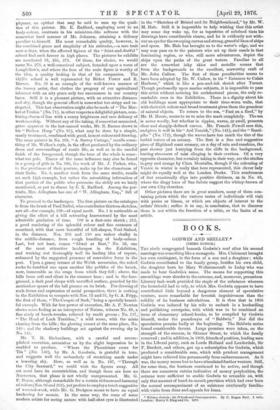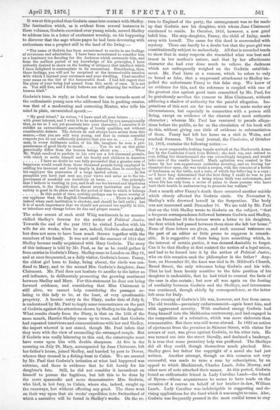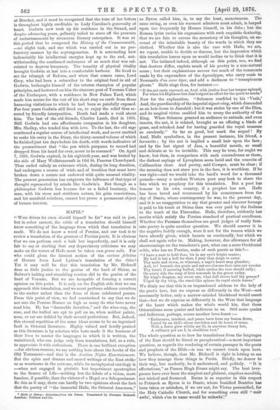BOOKS.
GOD WIN AND SHELLEY.*
[THIRD NOTICE.] THE circle congregated beneath Godwin's roof after his second marriage was something like a menagerie. Mrs. Clairmont brought her own contingent, in the form of a son and a daughter ; while Godwin contributed to the family group, besides his own child, the daughter born by Mary Wollatonecraft to Imlay who was made to bear Godwin's name. The means for supporting this- assemblage were slender in the extreme, and, moreover, precarious Literary task-work provided the staple of the substance whereon- the household had to rely, to which Mrs. Godwin appears to have contributed little beyond a dangerous element of speculative venture, more remarkable for feverish impulsiveness than the- solidity of its business calculations.. It is thus that in 1805 Godwin was induced by his wife to embark in a bookselling and publishing enterprise, with which was to be combined an issue of elementary school-books, to be compiled by Godwin himself, under the pseudonym of "Baldwin." Nor did the speculation promise badly at the beginning. The Baldwin series found considerable favour. Large premises were taken, on the strength of the success, in Skinner Street, to which the family removed ; and in addition, in 1808, friends of position, leading mea in the Liberal party, such as Lords Holland and Lauderdale, Sir F. Burdett, and others, got up a subscription for Godwin, which. produced a considerable sum, which with prudent management might have relieved him permanently from embarrassment. As it was, the money seems but to have stimulated further venture. Still„. for some time, the business continued to be active, and though there are numerous entries indicative of money perplexities, the returns were sufficient to enable Godwin to scramble on, with only that amount of hand-to-mouth provision which had ever been the normal accompaniment of an existence continually familiar- with visits from duns and appeals for loans.
* William Godwin: his Friends and Contemporaries. Bp O. Began Paul. 2 volF-. London : Henry S. King and Co. 1876.
It was at this period that Godwin came into contact with Shelley. The fascination which, as is evident from several instances in these volumes, Godwin exercised over young minds, moved Shelley to address him in a letter of exuberant worship, on his happening to discover that the sage whose pages he had been devouring with enthusiasm was a prophet still in the land of the living :—
" The name of Godwin has been accustomed to excite in me feelings of reverence and admiration. I have been accustomed to consider him as a luminary too dazzling for the darkness which surrounds him, and from the earliest period of my knowledge of his principles, I have ardently desired to share on the footing of intimacy that intellect which I have delighted to contemplate in its emanations. Considering, then, these feelings, you will not be surprised at the inconceivable emotion with which I learned your existence and your dwelling. I had enrolled your name on the list of the honourable dead. I had felt regret that the glory of your being had passed from this earth of ours. It is not so. You still live, and I firmly believe are still planning the welfare of human kind."
Godwin's tone, in reply, as indeed was the case towards most of the enthusiastic young men who addressed him in gushing strains, was that of a moderating and correcting Mentor, who tells his mind in plain, unvarnished speech :—
"My good friend," he writes, "I have road all your letters
with great interest, and I wish it to be understood by you unequivocally that, as far as I can yet penetrate into your character, I conceive it to exhibit an extraordinary assemblage of lovely qualities, not without considerable defects. The defects do and always have arisen from this source,—that you are still very young, and that in certain essential
respects you do not sufficiently perceive that you are so Every man, in every deliberate action of his life' imagines he sees a pre-
ponderance of good likely to result You do not on this point generically differ from the human beings about you When Mr. Walsh resolved to purloin to his own use a few thousand pounds, with which to settle himself and his family and children in America I have no doubt he was fully persuaded that a greater sum of • happiness would result from these thousand pounds being employed in settling his innocent and lovely family in America, than in securing to his employer the possession of a large landed estate In the pamphlet you have just sent me, your views and mine as to the im- provement of mankind are decisively at issue One principle that I believe is wanting in you, and in all our too fervent and impetuous reformers, is the thought that almost every institution and form of society is good in its place and in the period of time to which it belongs In this point of view, nothing perhaps can be more worthy of
our applause than the English Constitution There is a period indeed when each institution is obsolete, and should be laid aside; but it is of much importance that we should not proceed too rapidly in this, or introduce any change before its due and proper season."
The sober accent of such staid Whig sentiments in no manner chilled Shelley's fervour for the author of Political Justice. Towards the end of the year 1812 he visited London with his wife for six weeks, when he saw, indeed, Godwin almost daily, but does not seem to have been much thrown together with the members of his family. It was not until the summer of 1814 that Shelley became really acqiainted with Mary Godwin. The story of this intimacy is told by Mr. Paul, as far as he could gather it from entries in Godwin's Diary. Shelley came to London on May18, and at once frequented, as a daily visitor, Godwin's house. Fanny, the eldest girl born to Imlay, being absent, the circle was con- fined to Mary, and to the second Mrs. Godwin's daughter, Jane Clairmont. Mr. Paul does not hesitate to ascribe to the latter an evil influence, in deliberately promoting the growing sentiment between Shelley and Mary. For this statement he does not bring forward evidence, and considering that Miss Clairmont is still alive, we cannot help considering the passages re- lating to this lady to be, at the least, of very questionable propriety. A laconic entry in the Diary, under date of July 8, is understood by Mr. Paul to imply some remonstrance on the part of Godwin against the attentions shown by Shelley.to his daughter. What results clearly from the Diary, is that on the 15th of the same month, Harriet Shelley came up to town, and that Godwin had repeated inteiviews and communications with her and Shelley, the import whereof is not stated, though Mr. Paul infers that they were with the view of reconciling the estranged couple. But if Godwin was really labouring to this end, the catastrophe must have come upon him with double sharpness. At five in the morning on July 28, Mary, accompanied by Jane Clairmont, left her father's house, joined Shelley, and hurried by post to Dover, whence they crossed in a fishing-boat to Calais. We are assured by Mr. Paul that Godwin's irritation at what had happened was extreme, and there is evidence that he felt keenly for his daughter's fate. Still, he did not consider it incumbent on himself to pursue the fugitives, but left this to be done by the more spasmodic and more demonstrative Mrs. Godwin, who hied, in hot fury, to Calais, where she, indeed, caught up the runaways, but without effecting any good. The three went on their way upon that six weeks' expedition into Switzerland of which a narrative will be found in Shelley's works. On the re-
turn to England of the party, the estrangement was so far made- up that Godwin saw his daughter, with whom Jane Clairmont continued to reside. In October, 1816, however, a new grief befell him. His step-daughter, Fanny, the child of Imlay, made away with herself. The cause for this deed is surrounded with mystery. There can hardly be a doubt but that the poor girl was constitutionally subject to melancholy. All that is recorded tends to show that in many respects she resembled what was best and truest in her mother's nature, and that by her affectionate character she had ever done much to relieve the darkness which not unfrequently weighed on the Godwin establish- ment. Mr. Paul hints at a rumour, which he refers to only to brand as false, that a suppressed attachment to Shelley im- pelled the unfortunate Fanny to this false step. We know of no evidence for this, and the reference is coupled with one of the greatest sins against good taste committed by Mr. Paul, for he gratuitously ascribes the rumour to Miss Clairmont, without adducing a shadow of authority for the painful allegation. Im- putations of this sort are far too serious to be made under any circumstances, but especially in connection with a person still living, except on evidence of the clearest and most authentic character ; whereas Mr. Paul has ventured to parade allega- tions before the public, as far as the circulation of his book will do this, without giving one tittle of evidence in substantiation of them. Fanny had left her home on a visit in Wales, and
reached Swansea. The local journal, the Cambrian, of October 12, 1816, contains the following notice :— " A most respectable-looking female arrived at the Mstckworth Arms Inn by the Cambrian Coach from Bristol ; she took tea, and retired to rest, telling the chambermaid she was exceedingly fatigued, and wOuld take care of the candle herself. Much agitation was created in the house by her non-appearance yesterday morning, and on forcing her chamber-door open, she was found a corpse, with the remains of a bottle of laudanum on the table, and a note, of which the following is a copy : have long determined that the best thing I could do was to put an end to the existence of a being whose birth was unfortunate, and whose life has only been a series of pains to those persons who have- hurt their health in endeavouring to promote her welfare."
Just a month after Fanny's death there occurred another suicide- which closely affected the Godwin circle. On November 9, Shelley's wife drowned herself in the Serpentine. The body was not recovered until December 10. We are told by Mr. Paul that on the 16th Shelley wrote to Godwin on the subject, "that a frequent correspondence followed between Godwin and Shelley, and on December 24 the former wrote a letter to his daughter, the first which had passed between them since she left her home.'
None of these letters are given, and such unusual reticence on the part of an editor so little prone to suppress is remark- able. It is suggestive of there being here something which, in.
the interest of certain parties, it was deemed desirable to forget. Can it be that Shelley at first resisted the notion of a legal union,
and had to be forced into it by the author of Politica( Justice, who on this occasion sank the philosopher in the father? Any-
how, on December 30, the knot was tied in St. Mildred's Church., Bread Street, the only witnesses being Godwin and his wife.. That he had been keenly sensitive to the false position of his daughter is undeniable, that he had tried to conceal the facts of the case is also certain ; but now all was again on the footing of cordiality between Godwin and the Shelleys, and intercourse was continued, though chiefly by correspondence, as the latter left soon for Italy.
The evening of Godwin's life was, however, not free from cares:- The old trouble—pecuniary embarrassment—again beset him, and with aggravated severity. With unabated energy Godwin had flung himself into the Malthusian controversy, and had engaged in the composition of a refutation, which was more elaborate than remunerative. But there was still worse abroad. In 1822 an action of ejectment from the premises in Skinner Street, with claims for arrears of rent, was given against God win, to his utter ruin. He was turned out into the street literally, and declared a bankrupt. It is true that some pecuniary help was proffered. The Shelleys did all they could, though themselves much pinched. Mrs.
Shelley gave her father the copyright of a novel she had just written. Another attempt, though on this occasion not very successful, was made to raise a sum by subscription, by an.
appeal to which Mackintosh, Charles Lamb, John Murray, and other men of note attached their names. At this period, Godwia found an enthusiastic friend in Lady Caroline Lamb—the friend,
of Byron—whose acquaintance he seems to have made on the occasion of a canvas on behalf of her brother-in-law, William
Lamb. Lady Caroline was indefatigable in suggesting and de- vising applications for the fund which it was sought to raise. Also, Godwin was frequently pressed in the most cordial terms to stay
at Brocket, and it must be recognised that the tone of her letters is throughout highly creditable to Lady Caroline's generosity of heart. Godwin now took up his residence in the Strand, and despite advancing years, gallantly toiled to stave off the pressure of embarrassments by strenuous literary enterprises. It was at this period that he composed the History of the Commonwealth, —no slight task, and one which was carried out in no per- functory manner by the septuagenarian. It is astounding how indomitably his intellectual energies kept up to the end, not- withstanding the continued endurance of so much that was cal- culated to depress buoyancy. The tenacity of physical vitality brought Godwin at last into a comfortable harbour. He lived to tee the triumph of Reform, and when that season came, Lord Grey, who had been a subscriber to the original fund in aid of Godwin, bethought himself of the veteran champion of popular principles, and bestowed on him the sinecure post of Yeoman Usher of the Exchequer, with a residence in New Palace Yard, which made him secure for the rest of his short stay on earth from those harassing visitations to which he had been so painfully exposed. For four years Godwin still lived on, to enjoy the relief thus se- cured by friendly interposition. Death had made a void about him. The last of the old friends, Charles Lamb, died in 1834. Still Godwin had one affectionate companion in his daughter, Mrs. Shelley, who tended him with love. To the last, the old sage continued a regular course of intellectual work, and never omitted to make his entry in the Diary, the thirty-second volume of which he finished just ten days before his death, with words indicative of the presentiment that "the pen which purposes to record bad dropped from his hand for ever, never to be resumed." On April 7, 1836, Godwin expired, in his eightieth year, and was buried by the side of Mary Wollstonecraft in Old St. Pancras Churchyard. Thus ended calmly an existence which, during its long duration, had undergone a course of trials and of troubles that must have broken down a nature not endowed with quite unusual vitality. The present generation has outgrown the influence of that type of thought represented by minds like Godwin's. But though as a philosopher Godwin has become for us a faded luminary, the man, with his stern and stubborn nature, his grim convictions, and his manifold relations, cannot but prove a permanent object of human interest.




































 Previous page
Previous page